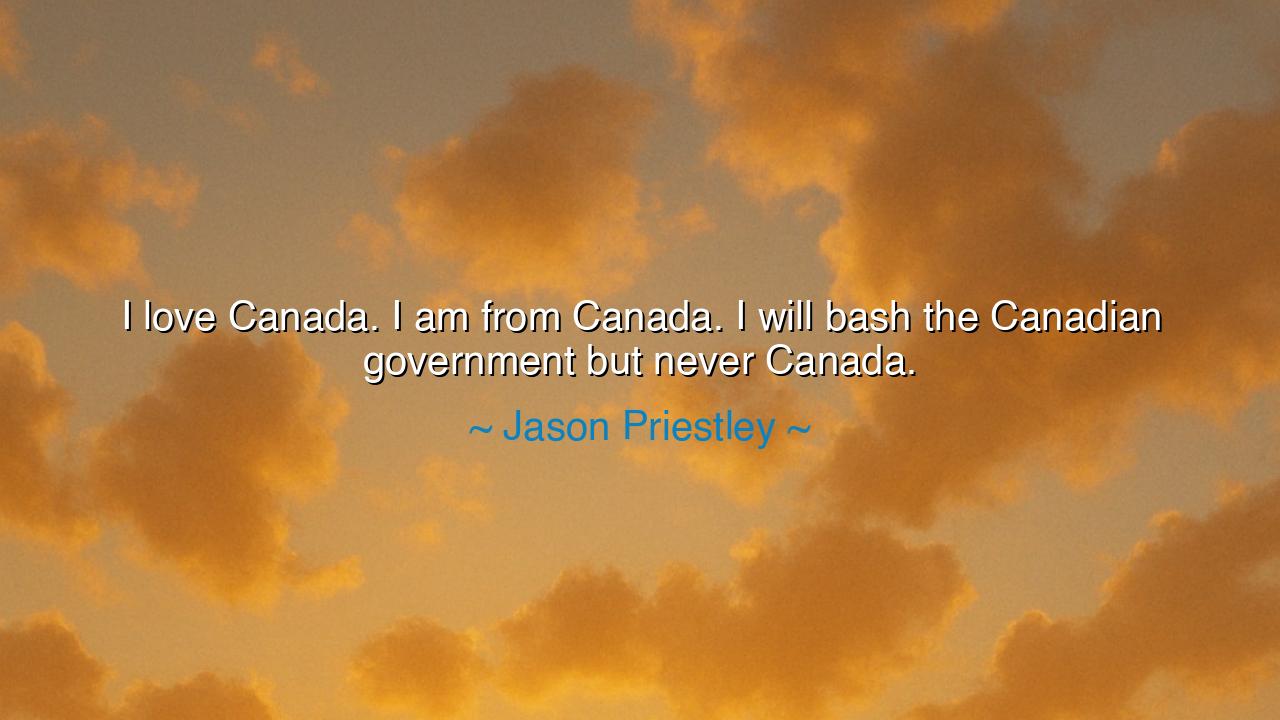
I love Canada. I am from Canada. I will bash the Canadian






Hearken, children of loyalty and discernment, to the words of Jason Priestley, who declared with unwavering affection and clarity: "I love Canada. I am from Canada. I will bash the Canadian government but never Canada." In this proclamation lies a profound meditation on patriotism, discernment, and the love of one’s homeland. Priestley reminds us that to criticize leadership is not to betray the land itself; it is, rather, an act of engagement, responsibility, and care for the enduring welfare of the nation.
The origin of this insight springs from the tension between allegiance to a country and the imperfections of its rulers. Priestley, a son of Canada, acknowledges that governments are human constructs, fallible and subject to error, while the nation—the people, culture, land, and spirit—transcends transient administrations. His statement is an echo of wisdom as ancient as the Greek philosophers, who distinguished between the enduring polis and the shifting ambitions of magistrates. To love one is not to condone all actions of the other.
Consider the imagery of love and critique intertwined. To "bash the government" is not hatred, but engagement; it is the courage to observe faults, demand accountability, and seek reform. Priestley’s declaration is a call to active citizenship, urging that loyalty to a nation must include the willingness to confront its failings, rather than blind acceptance. History is rich with those who loved their countries but challenged their rulers, understanding that criticism is a tool of preservation and renewal.
The wisdom of his words resonates with the life of Abraham Lincoln, who loved the United States deeply yet did not hesitate to confront the failures of his time, leading the nation through civil war to preserve its principles. Similarly, Martin Luther King Jr. held profound love for America while denouncing its injustices, seeking to elevate the nation toward its ideals. Priestley’s statement embodies this same duality: affection for the homeland, yet vigilance against the failings of those in power.
This insight also teaches the necessity of distinguishing the eternal from the temporal. Governments rise and fall, policies succeed and fail, but the essence of a nation—its people, heritage, and spirit—endures. Priestley’s love for Canada is not conditional upon the conduct of officials; it is rooted in a deeper identification with the land, the culture, and the collective soul of its citizens. Critique without love is cynicism; love without critique is complacency. Both must coexist for the health of the nation.
The lesson is timeless: true patriotism embraces responsibility and discernment. It demands that citizens speak truth to power, challenge injustice, and advocate for improvement, all while nurturing a deep respect and care for the enduring essence of their homeland. To separate government from country is to understand the nature of collective life: institutions serve, but the nation—the people, the land, and the culture—deserves unwavering respect and protection.
Practical actions flow from this wisdom: engage in civic life with courage; speak out against injustice and mismanagement without abandoning love for one’s country; educate oneself and others about the distinction between government policies and national identity; and foster a sense of pride rooted in heritage, culture, and shared values rather than blind allegiance. In doing so, one embodies the spirit Priestley articulates: love of country tempered by reasoned critique and moral engagement.
In sum, Priestley’s words remind us that the loyalty of a citizen is not blind, nor the act of criticism disloyal. One may demand accountability, reform governance, and challenge leaders, all while holding the nation itself in sacred regard. This duality—critique of the temporal, love of the eternal—is the hallmark of wise citizenship, the bridge between responsibility and devotion, and the path toward a nation that grows stronger through both reflection and love.
If you wish, I can craft an even more epic, mythic version, turning Priestley’s insight into a heroic narrative of love, critique, and national devotion—perfect for immersive audio storytelling. Do you want me to do that?






AAdministratorAdministrator
Welcome, honored guests. Please leave a comment, we will respond soon